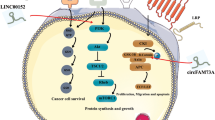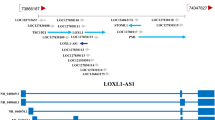Abstract
Aberrant expression of long non-coding RNAs (lncRNAs) plays pivotal roles in tumorigenesis of human malignant cancers, including esophageal squamous cell carcinoma (ESCC). However, the specific role of lncRNA NRSN2-AS1 in ESCC has not been investigated. Our analysis of clinical data revealed that NRSN2-AS1 was upregulated in ESCC tissues and negatively correlated with patient survival. Luciferase reporter assays and chromatin immunoprecipitation assays demonstrated that NRSN2-AS1 is transcribed by SOX2. In vitro functional experiments showed that NRSN2-AS1 can promote ESCC cell proliferation, migration, and invasion. Furthermore, NRSN2-AS1-binding proteins were detected using RNA pull-down assays and mass spectrometry. Mechanistically, NRSN2-AS1 can bind to phosphoglycerate kinase 1 (PGK1) and upregulate its protein levels by inhibiting its ubiquitination. Knockdown of PGK1 in part abolished the NRSN2-AS1 overexpression-induced effects on ESCC cell proliferation, migration, invasion, and epithelial‑mesenchymal transition (EMT). Thus, NRSN2-AS1 may be a diagnostic biomarker or treatment target for ESCC.







Similar content being viewed by others
Data availability
The datasets generated during the current study are available from the corresponding author on reasonable request.
References
Yang YM, Hong P, Xu WW et al (2020) Advances in targeted therapy for esophageal cancer. Signal Transduct Target Ther 5:229
Abnet CC, Arnold M, Wei WQ (2018) Epidemiology of esophageal squamous cell carcinoma. Gastroenterology 154:360–373
Baba Y, Nomoto D, Okadome K et al (2020) Tumor immune microenvironment and immune checkpoint inhibitors in esophageal squamous cell carcinoma. Cancer Sci 111:3132–3141
Yang J, Liu X, Cao S et al (2020) Understanding esophageal cancer: the challenges and opportunities for the next decade. Front Oncol 10:1727
Rajagopal T, Talluri S, Akshaya RL et al (2020) HOTAIR LncRNA: a novel oncogenic propellant in human cancer. Clin Chim Acta 503:1–18
Li J, Meng H, Bai Y et al (2016) Regulation of lncRNA and its role in cancer metastasis. Oncol Res 23:205–217
Sanchez Calle A, Kawamura Y, Yamamoto Y et al (2018) Emerging roles of long non-coding RNA in cancer. Cancer Sci 109:2093–2100
Lin YH (2020) Crosstalk of lncRNA and cellular metabolism and their regulatory mechanism in cancer. Int J Mol Sci 21:2947
Zhang Y, Chen W, Pan T et al (2019) LBX2-AS1 is activated by ZEB1 and promotes the development of esophageal squamous cell carcinoma by interacting with HNRNPC to enhance the stability of ZEB1 and ZEB2 mRNAs. Biochem Biophys Res Commun 511:566–572
Han GH, Lu KJ, Wang P et al (2018) LncRNA SNHG16 predicts poor prognosis in ESCC and promotes cell proliferation and invasion by regulating Wnt/β-catenin signaling pathway. Eur Rev Med Pharmacol Sci 22:3795–3803
Ren P, Zhang H, Chang L et al (2020) LncRNA NR2F1-AS1 promotes proliferation and metastasis of ESCC cells via regulating EMT. Eur Rev Med Pharmacol Sci 24:3686–3693
Hu W, Chen Z, Chen J et al (2020) LOC441178 overexpression inhibits the proliferation and migration of esophageal carcinoma cells via methylation of miR-182. Onco Targets Ther 13:11253–11263
Chen Q, Xie J, Yang Y (2021) Long non-coding RNA NRSN2-AS1 facilitates tumorigenesis and progression of ovarian cancer via miR-744–5p/PRKX axis. Biol Reprod. ioab212.
Wang J, Gu J, You A et al (2020) The transcription factor USF1 promotes glioma cell invasion and migration by activating lncRNA HAS2-AS1. Biosci Rep 40:BSR20200487
Wang H, Huo X, Yang XR et al (2017) STAT3-mediated upregulation of lncRNA HOXD-AS1 as a ceRNA facilitates liver cancer metastasis by regulating SOX4. Mol Cancer 16:136
Zhang Y, Yu G, Chu H et al (2018) Macrophage-associated PGK1 phosphory-lation promotes aerobic glycolysis and tumorigenesis. Mol Cell 71:201-215.e7
Pastushenko I, Blanpain C (2019) EMT transition states during tumor progression and metastasis. Trends Cell Biol 29:212–226
Fu Q, Yu Z (2020) Phosphoglycerate kinase 1 (PGK1) in cancer: a promising target for diagnosis and therapy. Life Sci 256:117863
Deng HY, Wang YC, Ni PZ et al (2016) Long noncoding RNAs are novel potential prognostic biomarkers for esophageal squamous cell carcinoma: an overview. J Thorac Dis 8:E653–E659
Sugihara H, Ishimoto T, Miyake K et al (2015) Noncoding RNA expression aberration is associated with cancer progression and is a potential biomarker in esophageal squamous cell carcinoma. Int J Mol Sci 16:27824–27834
Bian Z, Zhang J, Li M et al (2018) LncRNA-FEZF1-AS1 promotes tumor proliferation and metastasis in colorectal cancer by regulating PKM2 signaling. Clin Cancer Res 24:4808–4819
Novak D, Hüser L, Elton JJ et al (2020) SOX2 in development and cancer biology. Semin Cancer Biol 67:74–82
Porter L, McCaughan F (2020) SOX2 and squamous cancers. Semin Cancer Biol 67:154–167
Zhu Y, Huang S, Chen S et al (2021) SOX2 promotes chemoresistance, cancer stem cells properties, and epithelial-mesenchymal transition by β-catenin and Beclin1/autophagy signaling in colorectal cancer. Cell Death Dis 12:449
Gao H, Teng C, Huang W et al (2015) SOX2 promotes the epithelial to mesenchymal transition of esophageal squamous cells by modulating Slug expression through the activation of STAT3/HIF-α Signaling. Int J Mol Sci 16:21643–21657
Ferrè F, Colantoni A, Helmer-Citterich M (2016) Revealing protein-lncRNA interaction. Brief Bioinform 17:106–116
Rashid F, Shah A, Shan G (2016) Long non-coding RNAs in the cytoplasm. Genomics Proteomics Bioinformatics 14:73–80
Wang Y, Lu JH, Wu QN et al (2019) LncRNA LINRIS stabilizes IGF2BP2 and promotes the aerobic glycolysis in colorectal cancer. Mol Cancer 18:174
Guan Z, Wang Y, Wang Y et al (2020) Long non-coding RNA LOC100133669 promotes cell proliferation in oesophageal squamous cell carcinoma. Cell Prolif 53:e12750
Jian F, Che X, Zhang J et al (2021) The long-noncoding RNA SOCS2-AS1 suppresses endometrial cancer progression by regulating AURKA degradation. Cell Death Dis 12:351
Jiang H, Li T, Qu Y et al (2018) Long non-coding RNA SNHG15 interacts with and stabilizes transcription factor Slug and promotes colon cancer progression. Cancer Lett 425:78–87
Hu H, Zhu W, Qin J et al (2017) Acetylation of PGK1 promotes liver cancer cell proliferation and tumorigenesis. Hepatology 65:515–528
He Y, Luo Y, Zhang D et al (2019) PGK1-mediated cancer progression and drug resistance. Am J Cancer Res 9:2280–2302
Shao F, Yang X, Wang W et al (2019) Associations of PGK1 promoter hypomethylation and PGK1-mediated PDHK1 phosphorylation with cancer stage and prognosis: a TCGA pan-cancer analysis. Cancer Commun (Lond) 39:54
Santamaria PG, Moreno-Bueno G, Portillo F et al (2017) EMT: Present and future in clinical oncology. Mol Oncol 11:718–738
Yang H, Geng YH, Wang P et al (2019) Extracellular ATP promotes breast cancer invasion and epithelial-mesenchymal transition via hypoxia-inducible factor 2α signaling. Cancer Sci 110:2456–2470
Cheng L, Gou L, Wei T et al (2020) GBP1 promotes erlotinib resistance via PGK1-activated EMT signaling in non-small cell lung cancer. Int J Oncol 57:858–870
Zieker D, Königsrainer I, Tritschler I et al (2010) Phosphoglycerate kinase 1 a promoting enzyme for peritoneal dissemination in gastric cancer. Int J Cancer 126:1513–1520
Funding
This study was supported by Grants from the National Natural Science Foundation of China (No. 81772612), Natural Science Foundation of Hebei Province (No. H2020206363, No. 2021206259).
Author information
Authors and Affiliations
Contributions
All authors contributed to the study conception and design. Material preparation, data collection and analysis were performed by TX, ZY and JL. Figures and tables were prepared by LC, XL and YL. ZD recruited the patients and assisted the experiments. WG applied for Research Ethics Board approval. TX and WG wrote the manuscript and all authors approved the final manuscript.
Corresponding author
Ethics declarations
Conflict of interest
All authors are in agreement with the content of the manuscript and have no conflict of interest.
Ethical approval
This study was performed in line with the principles of the Declaration of Helsinki. Approval was granted by the Ethics Committee of the Fourth Hospital, Hebei Medical University and informed consent was obtained from all recruited subjects.
Additional information
Publisher's Note
Springer Nature remains neutral with regard to jurisdictional claims in published maps and institutional affiliations.
Supplementary Information
Below is the link to the electronic supplementary material.
10585_2022_10174_MOESM2_ESM.tif
Supplementary file2 (TIF 6043 KB) Fig. S1 Overexpression of NRSN2-AS1 promotes the proliferation, migration, and invasion of ESCC cells in vitro. A evaluation of NRSN2-AS1 overexpression in KYSE170 and ECA109 cells by qRT-PCR after transfection with an NRSN2-AS1 plasmid. B cell proliferation was analyzed by MTS in KYSE170 and ECA109 cells. C–D clone formation assays were conducted in KYSE170 and ECA109 cells. E-F. Cell migration and invasion were determined by transwell assays in KYSE170 and ECA109 cells (**P<0.01)
Rights and permissions
About this article
Cite this article
Xu, T., Yan, Z., Lu, J. et al. Long non-coding RNA NRSN2-AS1, transcribed by SOX2, promotes progression of esophageal squamous cell carcinoma by regulating the ubiquitin-degradation of PGK1. Clin Exp Metastasis 39, 757–769 (2022). https://doi.org/10.1007/s10585-022-10174-7
Received:
Accepted:
Published:
Issue Date:
DOI: https://doi.org/10.1007/s10585-022-10174-7




